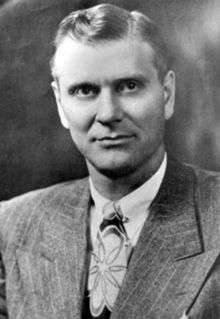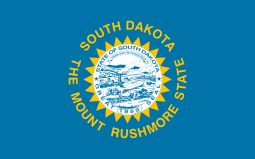George Theodore Mickelson
| The Honorable George Theodore Mickelson | |
|---|---|
 | |
| Judge of the United States District Court for the District of South Dakota | |
|
In office February 10, 1954 – February 28, 1965 | |
| Appointed by | Dwight D. Eisenhower |
| Preceded by | new seat |
| Succeeded by | Fred Joseph Nichol |
| 18th Governor of South Dakota | |
|
In office January 7, 1947 – January 2, 1951 | |
| Lieutenant |
Sioux K. Grigsby Rex A. Terry |
| Preceded by | Merrill Q. Sharpe |
| Succeeded by | Sigurd Anderson |
| Attorney General of South Dakota | |
|
In office 1943–1947 | |
| Preceded by | Leo A. Temmey |
| Succeeded by | Sigurd Anderson |
| Personal details | |
| Born |
July 23, 1903 Selby, South Dakota, U.S. |
| Died | February 28, 1965 (aged 61) |
| Resting place | Woodlawn Cemetery, Sioux Falls, Minnehaha County, South Dakota |
| Political party | Republican |
| Spouse(s) | Madge Turner |
| Children |
George S. Mickelson (son) Mark Mickelson (grandson) |
| Alma mater | |
| Occupation | Attorney |
George Theodore Mickelson (July 23, 1903 – February 28, 1965) was the 18th Governor of South Dakota, and later a United States federal judge.
Early life and education
George T. Mickelson was born near Selby in Walworth County, South Dakota. His father was a Norwegian immigrant.[1] Mickelson was the first Governor of South Dakota born in the twentieth century. Mickelson attended Dakota Wesleyan University and then received an LL.B. from the University of South Dakota School of Law in 1927.[2] That year he returned to Selby to practice law. He married Madge Turner[3] and they had four children.
Career
Prior to serving as governor, Mickelson, a Republican, served as states attorney for Walworth County, South Dakota from 1933 to 1936. He served in the South Dakota House of Representatives from 1937–1943 and was Speaker of the House in his last term. He then served as South Dakota Attorney General from 1943 to 1947. He became Governor of South Dakota in 1947, and served until 1951.
Mickelson ran as favorite-son candidate in 1952 South Dakota presidential primary, supporting a national bid of Dwight D. Eisenhower, and lost narrowly to Eisenhower chief rival, Senator Robert A. Taft of Ohio.[4]
On December 9, 1953, Mickelson received a recess appointment from President Eisenhower to a seat on the United States District Court for the District of South Dakota vacated by Alfred Lee Wyman. Formally nominated on January 11, 1954, Mickelson was confirmed by the United States Senate on February 9, 1954, and received his commission the following day. He served as chief judge of the court from 1954 until his death in 1965.[5]
Mickelson is the patriarch of the prominent Mickelson family of South Dakota. Mickelson's son, George S. Mickelson, served as Governor of South Dakota from 1987 to 1993. They are the only father and son duo to serve in that office in the history of South Dakota.[6] His grandson Mark Mickelson is the current Speaker of the House of Representatives in the South Dakota State Legislature.
Death
Mickelson died February 28, 1965, and is buried in Woodlawn Cemetery, Sioux Falls, Minnehaha County, South Dakota USA.[7]
References
- ↑ 1910 Census, Walworth County, South Dakota
- ↑ "George Theodore Mickelson". Biographical Directory of Federal Judges. Retrieved 18 October 2012.
- ↑ "George Theodore Mickelson". Find A Grave. Retrieved 2 September 2012.
- ↑ Our Campaign
- ↑ South Dakota Governor George Theodore Mickelson (National Governor's Association)
- ↑ Biographical Directory of the South Dakota Legislature, 1889-1989, p. 750.
- ↑ "George Theodore Mickelson". Find A Grave. Retrieved 2 September 2012.
External links
| Wikimedia Commons has media related to George Theodore Mickelson. |
- George Theodore Mickelson at the Biographical Directory of Federal Judges, a public domain publication of the Federal Judicial Center.

- The National Cyclopaedia of American Biography, Vol. 50 (New York: James T. White & Company)
- Find A Grave
| Political offices | ||
|---|---|---|
| Preceded by Merrell Q. Sharpe |
Governor of South Dakota 1947–1951 |
Succeeded by Sigurd Anderson |
| Legal offices | ||
| Preceded by Leo A. Temmey |
Attorney General of South Dakota 1943–1947 |
Succeeded by Sigurd Anderson |
| Preceded by Alfred Lee Wyman |
Judge of the U.S. District Court for the District of South Dakota February 10, 1954–February 28, 1965 |
Succeeded by Fred Joseph Nichol |
